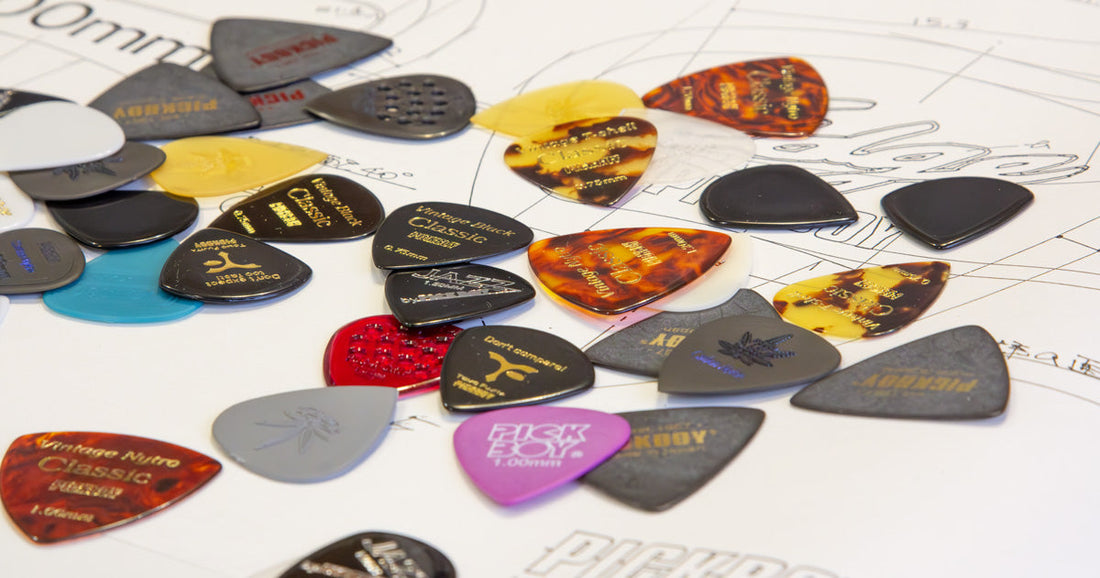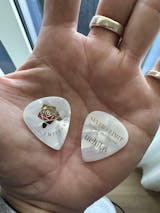
A guide to choosing a guitar pick | A thorough explanation of shape, material, and thickness [for beginners to advanced players]
Share
"I don't know what kind of pick to use" or "I just choose one without thinking" - this is a must-read for people like you, as we explain in detail how to choose a guitar pick!
We will explain how differences in picks, such as shape, thickness, and material, affect the sound and feel of playing, in a way that will be understandable to both beginners and advanced players.

▲ PICKBOY's diverse guitar picks. The material, thickness, and shape of the picks can greatly affect the sound and expression.
How does your pick choice affect your playing?
Guitar picks are small but extremely important in guitar playing. Choosing the right pick can make a big difference in how easy it is to play, the tone, and even the expression you can produce.
Why is pick selection important?
The pick is the first tool that touches the guitar strings. The pick you choose will affect the attack, response, and even the way you express nuance.
Finding a pick that fits your hand will make playing more comfortable.
Understanding the difference in sound produced by different picks
The hardness of the sound, the strength of the attack, the contours of the sound - all of these change depending on the pick.
The best pick will vary depending on the sound you are aiming for, such as "I want a soft and gentle sound" or "I want a tight, well-defined sound."
4 points to consider when choosing a guitar pick
① How to choose the shape (triangle, teardrop, etc.)
- Triangle type (rice ball type): It lasts a long time because you can use all three corners. It is stable and recommended for beginners.
View the triangle type - Teardrop shape: Ideal for delicate playing and lead playing, allowing for fine control.
View Teardrop Shape
Other than that,Jazz Type or Home base type There are also others.
② Characteristics and selection methods for different thicknesses (gauges)
3) Differences in materials (celluloid, nylon, Ultem, carbon, etc.)
Other than that,wood,metal,Resin-basedThere are unique materials such as:
④ Grip (presence or absence of anti-slip treatment, etc.)
Whether or not the instrument has a non-slip surface is also important when playing for long periods of time or during live performances. Models with sand or rubber grips allow you to concentrate on playing with peace of mind.
[For beginners] This pick is recommended for first choice
Medium gauge (0.6-0.8mm) x nylon materialThe picks are not too soft, are easy to play, and are well-balanced for both chords and leads.
See all Medium picks[For intermediate to advanced players] How to choose a pick that will give you the best tone
Recommended materials and shapes by genre
- Lock orientation: Teardrop-shaped carbon and Ultem material
- Jazz-oriented: Thick celluloid, teardrop shape
- Acoustic: Nylon or celluloid triangle type
- Suitable for technical and fast playing: Thick and non-slip Ultem material pick
What picks do pros use and why?
The reason why many professionals use thicker picks made from special materials such as Ultem or carbon is because they want accurate attack, response, and durability.
Summary: Find the right pick for you
- ✅ Picks affect not only the sound but also the ease of playing and playing style.
- ✅ Start with the classics and gradually choose what suits your taste
- ✅ It is important to compare the material, thickness, shape, and grip.
At PICKBOY,Picks available in a variety of materials, thicknesses, and shapes We have a wide selection of items. Come and find the one that's just for you!



